Understanding Precision Machining in Malaysia
Precision machining has emerged as a cornerstone of modern manufacturing, particularly in Malaysia, where it supports diverse industries such as automotive, aerospace, electronics, and medical device manufacturing. This high-precision process is vital for producing components that meet stringent quality, performance, and durability standards. When exploring options, precision machining malaysia offers a depth of expertise that can significantly enhance your manufacturing capabilities.
What is Precision Machining?
Precision machining refers to the manufacturing process of using computer numerically controlled (CNC) machines to create components with tight tolerances and complex geometries. It involves various operations such as turning, milling, drilling, and grinding. The goal of precision machining is to produce parts that conform to exact specifications, often requiring tolerances within ±0.001 inches or less.
This technology is prevalent in industries where high accuracy and quality are essential. For instance, in the aerospace sector, precision machined parts are critical for ensuring the safety and functionality of aircraft components. Similarly, the medical industry relies on precision machining for surgical instruments and implants that must meet strict regulatory standards.
Key Applications of Precision Machining
- Aerospace: Components such as turbine blades, engine parts, and structural elements.
- Automotive: Engine blocks, transmission components, and drivetrain parts.
- Electronics: Circuit boards, connectors, and housings.
- Medical: Surgical tools, implants, and diagnostic equipment.
- Energy: Parts for wind turbines, solar panels, and oil and gas equipment.
Trends in the Malaysian Precision Machining Industry
The precision machining industry in Malaysia is evolving rapidly, driven by advancements in technology and increasing demand for high-quality components. Some notable trends include:
- Automation: The integration of robotics and automation systems in machining processes is enhancing efficiency and precision.
- Industry 4.0: The shift towards smart manufacturing, incorporating IoT devices and data analytics, is enabling real-time monitoring and optimization of machining operations.
- Sustainability: Manufacturers are adopting green practices by utilizing eco-friendly materials and minimizing waste in machining processes.
Choosing the Right Precision Machining Partner
Selecting a reliable precision machining partner is crucial to ensure the success of your manufacturing projects. It is essential to evaluate several factors to make an informed decision.
Evaluating Capabilities and Technologies
When assessing potential machining partners, consider their technological expertise and the capabilities of their equipment. Manufacturers equipped with state-of-the-art CNC machines can achieve greater accuracy and efficiency. Look for partners that offer a variety of machining processes, such as CNC turning, milling, and electrical discharge machining (EDM), as this versatility can be beneficial for your project.
Assessing Quality Assurance Measures
Quality control is paramount in precision machining. Ensure that the partner you choose has robust quality assurance measures in place, such as ISO certifications. These certifications indicate that the manufacturer adheres to international quality standards, which is vital for the production of reliable components. Additionally, inquire about their testing and inspection processes to guarantee that the parts produced meet your specifications.
Understanding Pricing Structures in Malaysia
Pricing can vary widely among precision machining companies. Factors influencing pricing include material costs, complexity of the part, and the volume of production. It is advisable to obtain quotes from multiple suppliers and compare not just the prices but also the services offered. Remember that the cheapest option may not always deliver the best quality, so consider the value for the price you’re paying.
Best Practices for Precision Machining
To achieve optimal results in precision machining, implementing best practices is essential. Here are some strategies to enhance your machining operations.
Implementing Lean Manufacturing Principles
Lean manufacturing focuses on minimizing waste while maximizing productivity. In precision machining, this can be achieved by streamlining processes, reducing lead times, and improving workflow efficiency. By adopting lean principles, companies can lower operational costs and enhance overall production quality.
Utilizing Advanced CNC Technology
The advancement of CNC technology has revolutionized the precision machining industry. Utilizing multi-axis CNC machines allows for more complex geometries and better surface finishes. Moreover, advancements in software for design and simulation enable manufacturers to optimize machining processes before actual production, reducing trial-and-error costs.
Maintaining High Standards of Quality Control
Quality assurance should be embedded in every stage of the machining process. Regular calibration of machines, routine inspections, and comprehensive documentation of processes can help ensure consistent quality. Engaging in continuous improvement initiatives enables manufacturers to adapt to changes in demand and technology.
Overcoming Challenges in Precision Machining
The precision machining industry faces several challenges, including misconceptions about capabilities, supply chain disruptions, and a skills gap in the workforce.
Addressing Common Misconceptions
Many businesses still underestimate the value of precision machining, believing it to be an expensive and unnecessary process. This misconception can lead to missed opportunities for enhanced product quality and performance. Educating stakeholders on the long-term benefits of precision machining can help in overcoming these barriers.
Dealing with Supply Chain Issues
Global supply chain disruptions have impacted many manufacturers, including those in precision machining. To mitigate risks, companies should diversify their supplier base, maintain inventory buffers, and develop contingency plans to ensure continuity in operations. Building strong relationships with local suppliers can also enhance flexibility and responsiveness.
Strategies for Skill Development and Training
The skills gap in the manufacturing sector poses a significant challenge. Companies must invest in training and development programs to upskill their workforce. Collaborating with educational institutions can also facilitate the training of future talent, ensuring a steady supply of skilled workers in the precision machining industry.
The Future of Precision Machining in Malaysia
Looking ahead, the precision machining industry in Malaysia is poised for substantial growth and innovation. Several key developments are anticipated by 2025.
Predicted Innovations and Developments by 2025
Advancements in materials science, such as the development of new alloys and composites, will enable the production of lighter and stronger components. Furthermore, the integration of artificial intelligence in machining processes will enhance predictive maintenance, reducing downtime and improving overall productivity.
Impact of Industry 4.0 on Precision Machining
Industry 4.0 is set to transform precision machining into a more interconnected and efficient process. The rise of smart factories will allow for real-time data analysis and machine learning applications, leading to more informed decision-making and reduced operational costs. Predictive analytics will also play a crucial role in anticipating machine failures and optimizing production schedules.
Environmental Sustainability in Precision Manufacturing
With increasing emphasis on sustainability, precision machining companies will need to adopt eco-friendly practices. This includes using sustainable materials, recycling waste, and implementing energy-efficient processes. Manufacturers that prioritize sustainability will not only comply with regulations but will also attract environmentally conscious clients.



